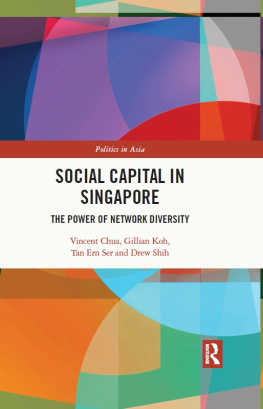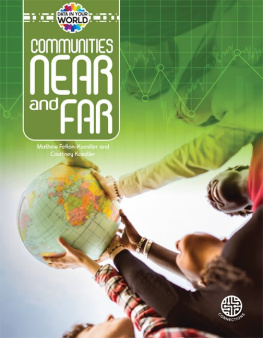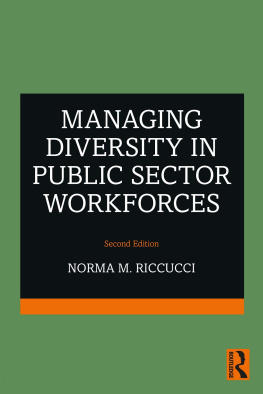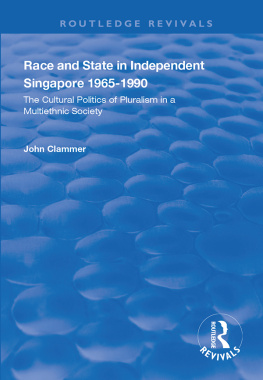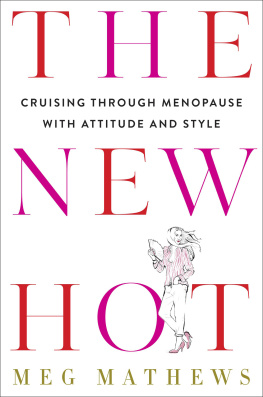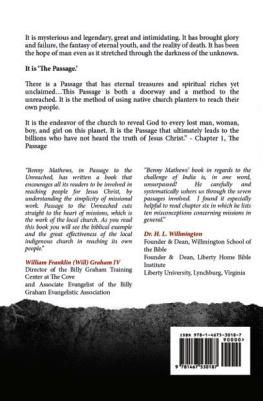


Published by
Imperial College Press
57 Shelton Street
Covent Garden
London WC2H 9HE
Distributed by
World Scientific Publishing Co. Pte. Ltd.
5 Toh Tuck Link, Singapore 596224
USA office: 27 Warren Street, Suite 401-402, Hackensack, NJ 07601
UK office: 57 Shelton Street, Covent Garden, London WC2H 9HE
British Library Cataloguing-in-Publication Data
A catalogue record for this book is available from the British Library.
MANAGING DIVERSITY IN SINGAPORE
Policies and Prospects
Copyright 2016 by Imperial College Press
All rights reserved. This book, or parts thereof, may not be reproduced in any form or by any means, electronic or mechanical, including photocopying, recording or any information storage and retrieval system now known or to be invented, without written permission from the Publisher.
For photocopying of material in this volume, please pay a copying fee through the Copyright Clearance Center, Inc., 222 Rosewood Drive, Danvers, MA 01923, USA. In this case permission to photocopy is not required from the publisher.
ISBN 978-1-78326-953-2
Desk Editor: Sandhya Venkatesh
Typeset by Stallion Press
Email:
Printed in Singapore
PREFACE
This edited volume was conceived back in 2011 when four of us, who were then part of the Society and Identity cluster at the Institute of Policy Studies (IPS), met to discuss future projects. Because we came from a range of disciplines Chiang Wai Fong, an anthropologist, Faizal Yahya, a political economist, Quek Guan Cheng, an educationist and Mathew Mathews, a sociologist, we quickly gravitated to the buzz word, diversity, which was a concept common in all of our respective disciplines. Since we were located in a policy institute, we were also well aware that our roles were not merely to explicate on the realities of diversity but also to examine the governance of this diversity. This is why we then scoped our project to focus on the management issues related to diversity.
Our then Director, Ambassador Ong Keng Yong was interested in our proposal to put together this volume primarily because he felt that this information would be useful for the many outside Singapore who look to Singapores models relative success at dealing with heterogeneity in the population. We are very thankful for Amb Ongs support and hope that this volume would, in a modest way, contribute to a critical understanding of diversity issues in Singapore. While the chapter writers have documented how Singapores management strategies on various fronts of diversity management have proven to be successful, they have also pointed out areas where such strategies have, in their opinion, not produced the best outcomes. Such critical review is indeed useful as Singapore society strives to become progressive and inclusive.
Mr Janadas Devan, the current Director of IPS continued his support for this project. We are grateful for his help and comments during an early workshop based on contributions from this book.
It has been a number of years before this edited volume could be finally completed. We are appreciative of all the authors who kindly contributed to this volume and stuck through the editing process. While the chapters have been updated whenever possible to incorporate newer developments, the main arguments proposed by the authors often reflect their views at the start of the project. In some cases, changes in government policies have addressed many of the issues which they surfaced. As such, some discussion of how diversity has been managed are historical facts that allow us to have a more complete picture of the processes of management.
We appreciate the scholars and policy makers who reviewed the book chapters. They provided useful comments which helped our chapter writers balance their arguments at times. We do not provide their names here as some preferred to be anonymous but we thank all of them for their generous efforts.
Our assistants at the institute provided much support in organising workshops, editing, and writing literature reviews, all of which allowed us to complete this manuscript. Our special thanks to Danielle Hong, Zhou Rongchen and Wong Fung Shing for their assistance.
Leong Wenshan provided much needed help with proof reading while Dr Gillian Koh and Mr Christopher Gee assisted us with the publication process in their respective tenures as IPS Publication coordinators.
We also appreciate the assistance of Sandhya Venkatesh and her team at World Scientific Press and Imperial College Press, who helped with the production of this edited volume.
Mathew Mathews
Chiang Wai Fong
INTRODUCTION: DIVERSITY IN SINGAPORE: HISTORICAL FOUNDATIONS AND CURRENT REALITIES
Mathew Mathews
GENESIS OF DIVERSITY
Emile Durkheim (1893/1933), often credited for the founding of the academic discipline of sociology was particularly concerned about how diversity affected the functioning of society. Based on his observations, before wide-scale industrialisation became common in most urban centres, societies were marked with relatively high levels of homogeneity. Those who shared a space in these pre-modern societies were part of the same economy and tended to be homogeneous on many fronts ethnically, linguistically, religiously, and in the norms and values that they embraced. Even when there were clear differences between members of these societies notably age and gender there were well accepted cultural prescriptions for how these differences had to be dealt with.
Modern society on the other hand, according to Durkheim, is marked with high levels of differentiation, a characteristic that arose as a result of the specialisation of labour during economic industrialisation. Theoretically, this differentiation does not necessitate a loss of social cohesion in societies. Greater differentiation actually means that people are increasingly mutually interdependent; without cooperating with one another, they are not able to fulfil their own individual needs. In reality though, based on Durkheims observations, modern societies have low levels of social cohesion. For Durkheim, this was because modern societies lacked a collective conscience, a solidarity based on common values which was common in pre-modern societies. The high levels of diversity in these societies have thrown the system into confusion in terms of the norms that are needed to regulate behaviour.
Confronting diversities of various kinds is an integral part of everyday life in modern/postmodern societies. Vertovec (2012) traces the history of affirmative action in the United States. Addressing the injustices experienced by African Americans, who experienced substantial discrimination, through legal means, became an important priority. A slew of initiatives seeking to ensure proportional representation of African Americans in educational institutions and workplaces, and subsequently other minority groups and women, were pursued. When subsequent US administrations became uneasy about affirmative action policies, the discourse shifted to diversity. It is no longer about having policies to obtain a certain representation of people in a sector; it is now about developing an organisational culture that is appreciative of the different experiences that follows a diverse workforce.





